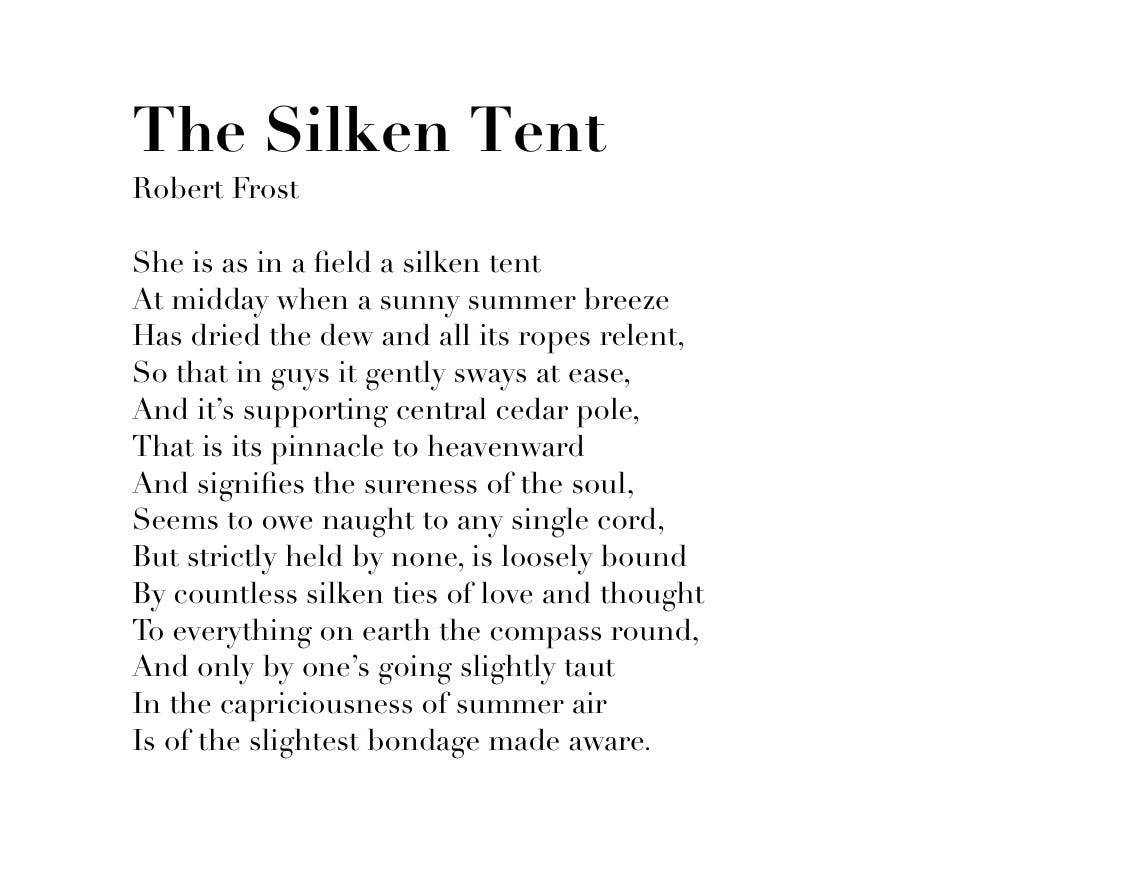Feel Your Ropes Go Taut
An October sunset, main characters, silken tents & bondage
Tonight the sunset was particularly spectacular. My run along the Hudson took twice as long as it should have because every few yards that I ran shifted my view such that the scene was entirely new and entirely staggering all over again. I had to stop and stare. I had to let myself be overcome which was not difficult.
And of course I wasn’t alone. The runners were all stopping, the walkers too, and the sitters it was just the kind of sunset that demands acknowledgement. The people were giddy with it, all separately together. Looking at each other with those did you see? and those yes, so beautiful kind of looks.
It’s moments like these that really bring into focus my own existence in within a vast web of interconnectedness. My ropes are tugged. We tend to like shiny things, and a sunset like this stops us in our tracks. Forget everything else, and there we are, tugging at each other’s ropes, saying look at this beauty, I see it too.
I’ve been noticing lately, though I know it’s probably nothing new, the proliferation of a sentiment that disturbs me. I was reading an essay the other day in which the writer off-handedly mentioned going through a difficult friend break-up. In a different one, the author ranted about how everyone in the world (presumably?) had become soulless and insufferable. In the middle she expressed that she had given up every relationship in her life—both friends and family—due to “conflicts of interest.”
I can take a rant with a grain of salt, though I don’t think salted consumption was the intent in this case. But I couldn’t stop thinking about how deranged the author sounded. How can anyone legitimatley claim that every single person they know and love (knew and loved) is walking around with values so corrupted that the relationship is unsalvagable? Or if salvageable, not worth salvaging. The burden to change will always be on the other because unlike everyone else, the writer is morally and actionably perfect.
Even more shocking to me! The piece had over a thousand likes and almost 100 comments, almost all of which were something in the vein of this!!!!! or I feel so seen. What the fuck?! But frankly, I shouldn’t be surprised. The sentiment that troubling relationships aren't worth maintaining in any way shape or form feels increasingly common. Protect your peace. Normalize ending relationships that no longer serve you. Be the main character.
In her recent piece for Aeon, Anna Gotlib argues says that while a certain preocupation with the self is nothing new, the tools that allow us to become the Main Character—to curate the way we represent ourselves so extensively and so publicly—are. I’m not one to overintellectualize social media trends, or make alarmist claims that they’re a) actively ruining society or b) signs of a ruined society. There’s plenty of fun to he had in acting like your life is a movie, and I know it’s meant lightheartedly by most who use the turn of phrase. BUT, when I do intellectualize the idea of main character energy even just a little bit, it becomes disturbing to me fairly quickly.
What is lost when centering the self is taken to the extreme? I posit that much is lost. The irreplaceable depth of long friendships, conflict resolution skills, self-sacrifice, being challenged. More than that, being the main character makes the people in your life secondary players at best, extras at worst. Gotlib uses the terminology of video games and says NPCs. You cease to believe in the interiority of others. You cease to believe in the importance of anything other than yourself.
Gotlib emphasizes that human beings are “fundamentally relational and interdependent,” and main character energy, or syndrome as she calls it, diametrically opposes this truth. For her (and me! I agree!) connection to others and love are the two most important human experiences. According to Albert Camus, Love is a moral duty. According to Harry Frankfurt, love is necessary and dangerous—it lies in the profound vulnerability of “seeing ourselves as always incomplete.”
Always incomplete! We are not main characters, we are not self-sufficient! Not if we are seeking a life of true fulfillment, at least, because at least some part true fulfillment relies on the relationships we have with the people we love.
My favorite poem of all time, which I’m sure I’ve told you before, is “The Silken Tent” by Robert Frost.
In it, an unidentified she is compared to a silken tent. The summer breeze blows gently and the tent “sways at ease.” The central cedar pole that supports the tent, and that is for our woman the “pinacle to heavenward,” the physical manifestation of “the sureness of the soul,” stands tall and confident. So much so that the eye might be tricked into thinking that it owes “naught to any single cord.”
But of course, that’s not so. You see, the silken tent, though “strictly held by none, is loosely bound / By countless silken ties of love and thought / to every thing on earth the compass round.” The woman lives a life of love. Lives a life of reliance. No matter how strong and sturdy your cedar pole is, no matter how polished and beautiful, and it’s cedar so it probably smells so good too—no matter! If you are not supported by countless ties of love and thought, a breeze that’s not so sunny and summery will come and will knock you over. It’s how tents work, and it’s how we work too.
What I love about this poem is the way that Frost captures the moment the ties are acknowledged. The wind blows one way and then the other and the ties go taut, the ropes are tugged. And what a gift to feel that feeling, that slight, sweet bondage. And how enriched is the sentiment by Frost’s choice of words? Bondage! Not a choice, not always pleasant, sometimes really very hard. But we are human and we are part of a vast web of interconnectedness.
This weekend my brother will get married. He will tie himself to his wife and she to him. In the joining, they will acknowledge their own insufficiency and incompleteness. They will become more whole. They will sway in the cool October breeze at the center of countless silken ties of love and thought. We will celebrate their bondage.





"The sentiment that troubling relationships aren't worth maintaining in any way shape or form feels increasingly common. "
I've noticed this, too. I was thinking about it yesterday in regard to a friend who holds different theological views than I do. (It's complicated.) And I was thinking about how much we .... not quite argue, really, more have politely-heated discussions over it. Yet I still value her friendship and she values mine. I think our friendship is worth maintaining, partially because I need to understand her viewpoint and I'm curious about how and why she has these viewpoints and because I like her as a person.